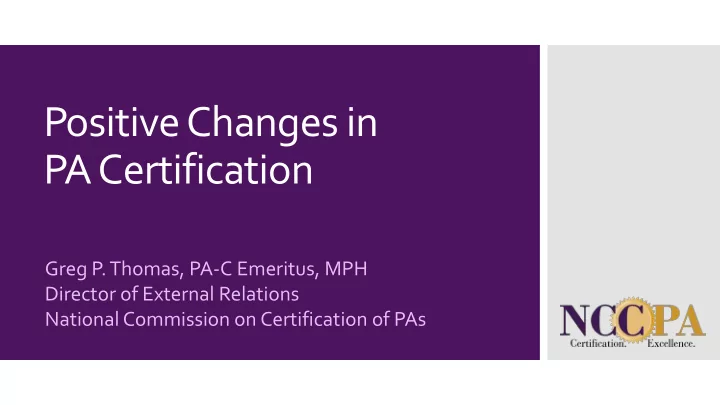

Positive Changes in PA Certification Greg P. Thomas, PA-C Emeritus, MPH Director of External Relations National Commission on Certification of PAs
Contractor with NCCPA Faculty No other financial relationships to Disclosure disclose
About NCCPA Presentation Initial Certification Outline Certification Maintenance Process
Brief Overview of NCCPA
11 PAs, 4 physicians and 2 public members Physician & Public 2017 PA Members Members Board of • 6 PA Directors-at-Large Directors: • 1 nominee from AMA • 1 nominee from AAPA • 1 nominee from AOA • 1 nominee from PAEA Current • 1 nominee from ACP • 1 nominee from FSMB Composition • 1 nominee from AAP • Immediate past chair • 2 public members • President/CEO
Initial Certification
Must be a graduate of an accredited PA program (single accreditation body = ARC-PA) Physician Assistant National Certifying Examination (PANCE) is required for initial licensure in all states and US Territories where PAs are authorized to practice Initial International medical graduates and US medical Certification graduates who have not matched are not eligible to sit for PANCE 300 question, 5-hour general medical knowledge exam 6 attempts to pass (within 6 years) and then lose eligibility
Certification Maintenance Process
100 CME credits every two years - 50 Category 1 credits - Self-assessment CME and PI-CME are optional Physician Assistant National Recertifying Examination (PANRE) every 10 years Certification PANRE is 240-question, 4-hour core medical knowledge exam Maintenance Announced in August 2016: PANRE will transition from Process “general” to “core” medical knowledge
Decided in May 2017, NCCPA will pilot alternatives to the high stakes recertification exam no later than 2020 Pilot Alternative Announced October 2017, pilot will be available in 2019-2020 to PANRE All PAs due to take PANRE in 2018 or 2019 are eligible Coming Sooner Current certification will be extended through the pilot Than Expected for those PAs who participate Sign-up window is early 2018 through June 2018
Longitudinal assessment of core medical knowledge During each quarter, questions can be answered over time, from any device, anywhere Pilot Design
More frequent assessment = more effective process Also Facilitates for gaining and maintaining knowledge Learning and Immediate feedback on whether the question was answered correctly Maintenance of Item critiques will explain why the correct answer was Current best and why the others were not Knowledge List of references for those who want to learn more about the topic
No travel to test center, no preparation, can be done on computer or mobile device Follows models being piloted by physician specialty boards More On the Participants will be required to provide feedback Pilot throughout the process Same cost as PANRE ($350) All the details on NCCPA website: http://www.nccpa.net/alternative-to-panre
A number of physician certification boards are piloting or introducing similar assessment programs Our discussions were informed by meetings with some A Larger of them: Movement - American Board of Anesthesiologists - American Board of Pediatrics - American Board of Medical Specialties (umbrella organization)
Thank you! Contact: gregt@nccpa.net www.nccpa.net www.PAsDoThat.net
Recommend
More recommend